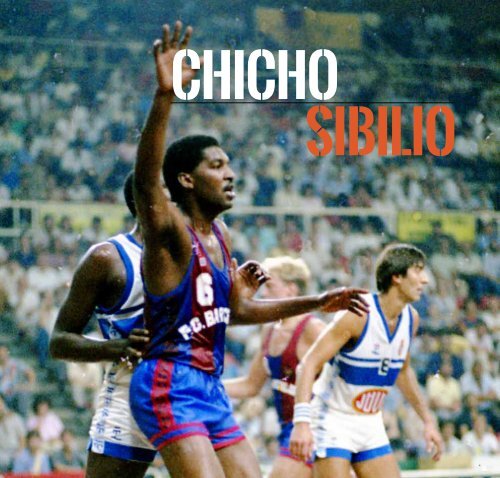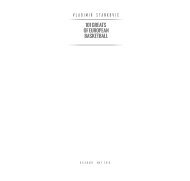CHICHO SIBILIO - 101 Greats of European Basketball
- No tags were found...
Create successful ePaper yourself
Turn your PDF publications into a flip-book with our unique Google optimized e-Paper software.
Chicho<br />
Sibilio<br />
319
The Dominican<br />
shooter<br />
At the end <strong>of</strong> a recent Spanish League<br />
regular season, some breaking news<br />
emerged: Alberto Corbacho <strong>of</strong> Blusens<br />
Monbus had established a new record<br />
with an average <strong>of</strong> 3.21 three-pointers<br />
made per game. Corbacho put an end<br />
to the reign <strong>of</strong> Chicho Sibilio and his record from 1986-<br />
87 <strong>of</strong> 3.14 threes per contest – a record that lasted 26<br />
years. I am sure that some <strong>of</strong> the younger fans are<br />
wondering who Chicho Sibilio is.<br />
This is the story <strong>of</strong> a great player who arrived from a<br />
small country in the Caribbean that did not have a powerful<br />
national team but featured some interesting players<br />
and a great star: Cándido Antonio Sibilio Hughes,<br />
who was born on October 3, 1958 in San Cristobal,<br />
Dominican Republic, and is simply known as “Chicho”<br />
by the basketball world.<br />
In a great story about him in “Informe Robinson”,<br />
a show on Spanish TV hosted by Mike Robinson, the<br />
player himself said that the great Serbian coach Ranko<br />
Zeravica “fell in love” with him in the mid-1970s. I talked<br />
to Zeravica and he told me an interesting story about<br />
Chicho:<br />
“Through several sources, we got word that in the<br />
Dominican Republic there was a very interesting player.<br />
A shooting guard with NBA potential, whose name<br />
I don’t remember now. So, with Eduardo Portela, then<br />
with FC Barcelona, we set up a tour <strong>of</strong> the Dominican<br />
national team with the idea <strong>of</strong> watching that other player<br />
and signing him if he convinced us. It so happened<br />
that I saw a slim small forward who had the touch <strong>of</strong><br />
the very best shooters. I told Portela right away that<br />
I wanted this forward and that we had to sign him no<br />
matter what. That’s how we signed Chicho Sibilio at 17<br />
years old.”<br />
That was the start <strong>of</strong> a brilliant career that ended<br />
in 1993, after 13 years in Barcelona and four more in<br />
Taugres Baskonia <strong>of</strong> Vitoria. Sibilio played 348 Spanish<br />
League games in which he averaged 28 minutes, 17.3<br />
points on 42% three-point shooting, 58% accuracy on<br />
two-pointers and 79% on free throws. But behind the<br />
numbers we find a versatile player whose 2.00-meter<br />
height allowed him to play every position except point<br />
guard and center. “He was a smart player and he learned<br />
fast, he was willing to work,” explained Zeravica. “However,<br />
his main weapon was always his shooting. Too<br />
bad that triples arrived only in 1984. He spent almost<br />
half <strong>of</strong> his career without three-pointers.”.<br />
With the arrival <strong>of</strong> Sibilio, Barcelona formed a lethal<br />
duo <strong>of</strong> forwards completed by legend Juan Antonio<br />
“Epi” San Epifanio. With a great floor general in Nacho<br />
Solozabal, Barcelona had the core <strong>of</strong> a great team for<br />
many years. With that team, Sibilio won five Spanish<br />
Leagues (1981, 1983, 1987, 1988 and 1989), eight<br />
Spanish King’s Cups (1978, 1979, 1980, 1981, 1982,<br />
1983, 1987 and 1988), two Saporta Cups (1985, 1986),<br />
one Korac Cup (1987) and one Intercontinental Cup<br />
(1985). In 1992, Sibilio scored his 650th triple and on<br />
April 4, 1993, he became the first Spanish League player<br />
with 6,000 career points.<br />
No EuroLeague crown<br />
Realizing the rough diamond that it held in its<br />
hands, FC Barcelona managed to get a quick nation-<br />
<strong>101</strong> greats <strong>of</strong> european basketball<br />
Chicho Sibilio<br />
S
Vladimir Stankovic<br />
alization for Sibilio, which also benefitted the Spanish<br />
national team. Sibilio made his debut at the 1980<br />
Olympics in Moscow. He played 87 games with the red<br />
jersey, scoring 1,324 points and winning a silver medal<br />
at EuroBasket 1983 in Nantes. His last big tourney<br />
with Spain was the 1987 EuroBasket in Athens. Over<br />
the course <strong>of</strong> those years, Sibilio averaged 16.7 points<br />
per game in FIBA competitions, from the 21.6 at those<br />
Moscow Olympics in 1980 to 10.0 at the 1987 Euro-<br />
Basket.<br />
I think I saw Sibilio live for the first time in Moscow in<br />
1980. After that, our paths crossed at several EuroBaskets<br />
and other competitions. I still remember how the<br />
ease with which he shot caught everyone’s attention.<br />
He needed minimal space to create his shots, which<br />
were true bombs that formed a high arc and almost<br />
always went in! His moves and sixth sense to choose<br />
the best spot for a shot would be a valuable lesson<br />
nowadays in any school for shooters.<br />
Sibilio was also a fast player who was able to run<br />
the break and was a good rebounder. As sometimes<br />
happens with shooters, he was <strong>of</strong>ten called out for not<br />
caring much about defending his man, but I always say<br />
it is easier to find or create a defensive specialist than a<br />
great shooter.<br />
Ultimately, throughout his great career, there was<br />
something missing, as has happened with other greats <strong>of</strong><br />
<strong>European</strong> basketball: a EuroLeague title. Sibilio was close<br />
two times, but on both occasions the trophy slipped away.<br />
Barcelona played the 1984 final against Banco di Roma<br />
and lost 79-73 despite Epi’s 31 points. Chicho was not at<br />
his best with only 4 points and poor 2-for-10 shooting that<br />
night. His second chance came in 1989 in Munich, but in<br />
semifinals, Jugoplastika Split, the eventual champ, won<br />
87-77 with the great trio formed by Toni Kukoc (24 points),<br />
Dusko Ivanovic (21) and Dino Radja (18) outdueling Epi<br />
(16), Audie Norris (15) and Chicho (15). In the aftermath <strong>of</strong><br />
that defeat in Munich, Sibilio left the team. He then signed<br />
for Baskonia where, with less pressure, he played four<br />
good seasons before retiring at age 35.<br />
There were also other <strong>European</strong> competitions, <strong>of</strong><br />
course. In 1981, Barca lost the Saporta Cup final against<br />
Squib Cantu with just a symbolic contribution by Sibilio<br />
<strong>of</strong> 3 points. In 1985, in the same competition, Barcelona<br />
defeated Zalgiris Kaunas with Arvydas Sabonis (14<br />
points, 16 rebounds), Rimas Kurtinaitis (36 points) and<br />
Valdemaras Chomicius in the final. Sibilio scored 29<br />
points on great shooting: 8 <strong>of</strong> 16 twos, 3 <strong>of</strong> 3 threes<br />
and 4 <strong>of</strong> 4 free throws. That same year, Barcelona won<br />
the Intercontinental Cup against Monte Libano <strong>of</strong> Brazil<br />
(93-89) with 39 points by Epi and 27 by Sibilio. Marcel<br />
de Souza had 38 for the opponents. It was a celebration<br />
<strong>of</strong> three great shooters.<br />
One year later, Barcelona repeated the Saporta<br />
Cup title, this time beating Scavolini Pesaro <strong>101</strong>-86 as<br />
Chicho scored 25 points and Epi 20. Sibilio’s trophy<br />
case was completed with the 1987 Korac Cup after a<br />
double win over Limoges as Sibilio totaled 33 points in<br />
the two-game series.<br />
Natural talent<br />
Sibilio’s teammates in Barcelona and with the<br />
Spanish national team described him as a “natural<br />
talent” (Juanma Lopez Iturriaga); “the first pure forward”<br />
(Fernando Romay); “excellent, even without<br />
practicing a lot” (Solozabal). He had something that<br />
great shooters have: it looked like everything he did<br />
was easy, natural, effortless. Of course, it was not like<br />
that, and it was his talent that made so many shots go<br />
in as if it were second nature. He was the top scorer<br />
320<br />
321
Centrobasket Championship. The Dominican Republic,<br />
the host <strong>of</strong> the event, finished fourth behind Mexico,<br />
Puerto Rico and Cuba. Sibilio never lost his connection<br />
with his home country, where he currently lives. He<br />
coached several local teams and was also a member<br />
<strong>of</strong> the technical staff <strong>of</strong> the federation. However, his<br />
biggest job was in his academy, given his desire to produce<br />
a player with the same talent as him. It is a difficult<br />
challenge because Chicho was very good. For me – if we<br />
exclude big powers with long traditions like Argentina,<br />
Brazil and Puerto Rico – he’s the best Latino player ever,<br />
together with Manuel Raga.<br />
Chicho Sibilio<br />
in the Spanish League twice (1986-87 and 1987-88)<br />
and he was chosen MVP <strong>of</strong> the all-star game in 1990<br />
in Zaragoza.<br />
Even though Sibilio was internationally recognized<br />
as a Spanish player, prior to signing with Barcelona in<br />
1975, he already caught everyone’s attention at the<br />
<strong>101</strong> greats <strong>of</strong> european basketball<br />
S

















